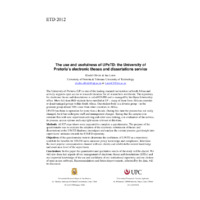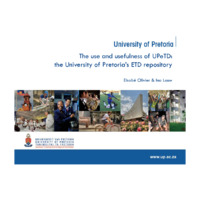The use and usefulness of UPeTD: the University of Pretoria’s electronic theses and dissertations service
Metadata
The use and usefulness of UPeTD: the University of Pretoria’s electronic theses and dissertations service
actively supports open access to research literature for all researchers worldwide. The repository for electronic theses and dissertations is called UPeTD and is managed by the Open Scholarship office. More full-time PhD students have enrolled at UP – many of them from African countries or disadvantaged groups within South Africa. Our student body is a diverse group – in the graduate group almost 50% come from other countries in Africa. UPeTD has been in operation for more than a decade. During this time the process has not really changed, but it has undergone staff and management changes. Seeing that the campus is in constant flux with new supervisors arriving and older ones retiring, a re-evaluation of the service, its process, access options and copyright seems relevant at this time. Methods: All UP supervisors were requested to complete a questionnaire. The purpose of the questionnaire was to evaluate the adoption of the electronic submission of theses and dissertations to the UPeTD database; investigate and analyse the current process; gain insight into supervisors’ attitudes towards the UPeTD repository. Objectives of the questionnaire were to determine the usefulness of UPeTD as a repository; establish the benefits for UPeTD users; measure policy knowledge and compliance; determine the most popular communication channel with our clients; and establish the current knowledge and awareness level of the supervisors. Conclusions: In this paper the quantitative and qualitative results of the study will be shared. We will also share key aspects of our management of electronic theses and dissertations (ETDs) and our improved knowledge of the use and usefulness of our institutional repository and our choices of open access software. Recommendations and future improvements, informed by the data, will be discussed.
2012


